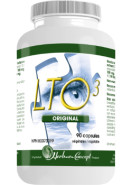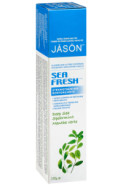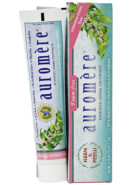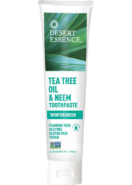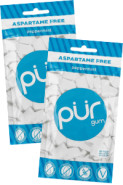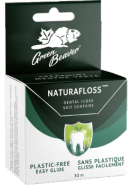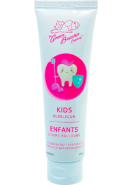Manuka & Propolis Toothpaste - 67ml - Manuka Health
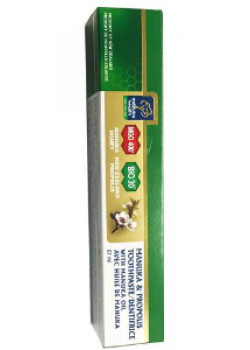
We're sorry, we no longer carry this item.
Check These out
Suggested, Similar, & Related Products:
Or, Shop our Latest Deals:
Shop Now >Format
 Paste
Paste
67ml
Dosage
For better results, brush your teeth with Manuka & Propolis Toothpaste after every meal.
Important Information
Does not contain any fluoride, preservatives, or sodium lauryl sulfate (SLS)
Cautions & Warnings:Allergic reaction may occur, especially in people who are allergic to bees.
- Natural Ingredients
- MGO 400+ Manuka Honey, BIO30 & New Zealand Propolis, and Manuka Oil
- Antiseptic & Antibacterial
- No Fluoride, Sodium Lauryl Sulfate or Preservatives
Related Videos
No Related VideosArticles by a naturopathic doctor.
Maintaining the health of your mouth can help to protect the health of your entire body ...
While we have all heard our dentists lecture us about the importance of proper oral healthcare, many of us often don't think much more about the subject. Even less of us actually consider our oral health to be integral to the health of our entire body. The truth is: our oral health affects our digestive health and the immune function throughout our bodies. Our mouth is the entrance to our entire digestive tract, and that's where over 70% of our immune system lives.
From this, we can easily see why maintaining our oral health is essential to our overall wellbeing. Not to mention how having an attractive smile can boost your mental health and wellbeing and give you a sense of confidence.
Mouth
Each of our mouths is like a miniature living ecosystem. Our gums, tongue, mouth walls and cheeks are all living tissue, and believe it or not so are your teeth! Although we are all raised thinking of our teeth like inanimate bone, they are actually complex living tissue. In fact, if you check out our Bone Health article, you will see the same is actually true of your bones! Keeping the mouth environment healthy and balanced is the most important thing that you can do for your oral health.
Teeth
Each tooth is made up several different layers that are both complex and dynamic. The outer layer above the gumline is called the enamel and is made up of hydroxyapatite crystals, much like our bones (see our Calcium article for information). Below the gumline, the outer layer of the root is made up of cementum, which consists of mineralized Collagen tissue. The innermost layer of the tooth is called the pulp and is made up of blood vessels, living cells and nerves. Between the hard shell layers and the inner pulp, lies the dentin, which is a dense network of mineralized tubules that allow for nutrient transport from the pulp to the enamel. These are the tubules that can transmit temperature and chemical changes in the mouth to the nerves in the pulp when they are exposed in areas where the enamel is worn too thin, resulting in tooth sensitivity.
Thinning Enamel
The enamel layer turns over throughout the day, and exchanges minerals with our saliva, depending on the surrounding pH. In acidic saliva, the enamel loses minerals and weakens, while basic saliva can allow the repair of the enamel. When the enamel becomes thinned, it can allow for transmission of temperature and chemicals through the dentin to the nerves of the pulp, causing sensitive teeth. As the enamel continues to erode away, it allows for erosion of the dentin, which then requires dental repair like a filling. Once the enamel is worn away it can no longer be repaired. Fillings are meant to replace the protective layer over the dentin to prevent erosion into the inner tooth. If the erosion continues into the pulp layer, it can result in an abscess or infection that can require a root canal. In a root canal, the dentist will drill out the pulp, killing the tooth and filling it with inanimate amalgam material.
Gums
The roots of our teeth are set into our jawbones and held in place by strong connective fibrous ligaments. These are all surrounded by soft tissue, which helps to protect the bones and hold the teeth in place. All of this tissue is referred to as our gums. This is the tissue that allows our immune system to protect and defend our teeth. Much like our other body tissues, our gums require certain nutrients to say healthy.
For more information, please see our Skin Health article. Between the gums and the teeth, there are small gaps where food and bacteria can lodge and cause irritation, which is why frequent flossing is so important to help keep these areas clear.
When bacteria is allowed to grow, it irritates the gums and they pull away from the tooth, making the pocket larger and creating receding gums. This can result in gingivitis and periodontis, both of which have been linked to health conditions such as: premature births, IBS, and heart disease (Hearth Health). The gums are quite thin, and any breaks can allow for penetration of bacteria and chemicals directly into the bloodstream. Thus, it is essential to maintain gum health to help protect the body against toxicity and infection.
Saliva
Although we often take our spit for granted, it plays a huge role in our health! Saliva contains the first enzymes of digestion, allowing us to cleave certain starch bonds and break them down into simple sugars. It also contains antibodies that help to protect us against infections that enter through the mouth. The pH of our saliva has a huge effect on our health as well. Our saliva contains minerals that can help to repair our enamel. When our saliva is acidic, it actually draws minerals out of our enamel, which weakens the structure of our teeth. When our saliva is neutral (pH 7), it can help to reverse this process and repair damaged enamel. Yes, you heard that correctly: changing your pH can help to protect your teeth, and even reverse early cavities! Staying well hydrated during the day, and avoiding mouth breathing (see our Snoring article) at night can help to maintain sufficient saliva in the mouth to help protect the teeth.
Cavities and Bacteria
Bacteria that can colonize the human body enjoy warm, moist environments. This makes your mouth an ideal place to be! Given the right environment, these bacteria can create a biofilm that coats the teeth and makes them resistant to removal. When given sugar, bacteria quickly use it for growth and create acidic waste products. This waste can create an acidic environment around your tooth that results in enamel loss. As the bacteria die off and reproduce, they create tartar along the teeth, which can become mineralized by saliva and create calculus. This calculus prevents the saliva from properly performing its protective function. Removing food debris, cleaning the teeth of tartar before it is mineralized, and changing the diet can quickly reduce the ability of bacteria to grow in your mouth.
Mercury Amalgams
If you have silver coloured fillings in your mouth, chances are that they contain mercury. Sadly, many dentists are still using mercury amalgams as a cheap filling alternative. In Sweeden these were outlawed in 2008, but North America hasn't caught up yet. Research has shown that these fillings off-gas mercury as we chew, particularly when chewing gum. Whether the amount released is detrimental is a point of contention in the dental community. No matter what, mercury is a known toxin that can disrupt nervous function and eventually cause brain damage. Exposures accumulate in our bodies over time, making the effects cumulative. Because of this, many holistic dentists will offer a safe mercury amalgam removal and replacement with benign white dental amalgams. If you choose to do this, be sure to research the process they are using to make sure that you will not be exposed to more mercury with the removal than by just leaving them in your mouth. See our Mercury Detox article for more information.
Maintaining pH
One of the most important factors influencing oral health is the pH of our mouth environment. Saliva pH is directly influenced by acid-base balance in the body. Eating a diet rich in fruits and vegetables, and avoiding excess animal products is the fastest way to change your body's chemistry. For more information on how to keep your body alkaline, please see our Acid-Alkali Balance and Alkaline Diet articles. Rinsing the mouth with salt water can also help to quickly return the pH to more balanced levels.
Flossing
I put this paragraph before brushing because most of us are much better at being disciplined with brushing than we are with flossing. I can't count the number of sheepish admissions I've made over the years at my dentist's office, followed by a week or two of guilt flossing that eventually fades out. After researching more about this, my habits changed; Flossing is as important, if not more important than brushing. Getting those areas between your teeth and into the pockets in the gums, helps to prevent the accumulation of food debris and bacteria that cause gum disease and increase your risk for health concerns. Getting into the habit of flossing after every meal, or even just daily, can significantly reduce your risk of gum disease and help to protect your overall health. Don't worry if your gums bleed the first few times, this is actually a sign that your gums are irritated and you need to floss more often. After 2-3 days the bleeding will stop.
Brushing Your Teeth
Most of us have been trained from as early as we can remember how important brushing regularly can be to our oral health. It removes food debris and helps to kill excess bacteria in the mouth. What we aren't told is that many of our commercial toothpastes are full of chemicals that can actually damage our health. For more information and for toothpaste alternatives, please see our Toothpaste article. Brushing after each meal can help to protect the health of your whole body. Be sure to wait some time after sugary or acidic meals to allow the saliva to clear away excess sugar and neutralize the pH as much as possible before brushing, so the enamel can remineralize and not be lost with brushing. Be sure to use a soft toothbrush and gently brush each tooth in a sweeping motion starting at the gums and brushing away (downwards on the upper teeth and upwards on the lower teeth).
Tongue Cleaning and Mouthwash
One of the major reservoirs of bacteria and food debris is our tongue. Being sure to clean the tongue properly either with your toothbrush or with a tongue scraper, can significantly reduce the buildup of bacteria in your mouth. It is also a great way to keep your breath fresh and reduce halitosis. For more information, please see our Halitosis article. Using alcohol based mouth washes can actually damage the gums and contribute to recession. Instead, try rinsing with salt water to neutralize pH and help kill bacteria. Topical Clove oil is a natural analgesic (pain killer) when used on the teeth and gums. Goldenseal, sage and thyme can be made into teas and used as an antibacterial mouthwash.
Diet and Lifestyle
It won't come as a shock to any of you that your diet affects the health of your entire body, and this includes your oral health. Eating processed foods high in refined sugars makes for quick and efficient food for the bacteria in your mouth. It also does not provide your body with sufficient nutrients to maintain the health of your mouth and teeth. Sugar-laden and acidic foods can contribute to enamel loss, as can chewable vitamin C tablets. Eating a diet rich in fruits and vegetables can provide these nutrients and help to keep the body alkaline, which in turn keeps the saliva at a healthy pH. Raw crunchy foods like apples and carrots can naturally clean the teeth as you chew. Drinking plenty of water helps the body to produce sufficient saliva to coat and protect the teeth. Stress and hormonal imbalances both contribute to poor oral health as well. Living a healthy lifestyle and taking care of your entire body is a great way to improve your oral health. Having a radiant smile will go very well with your glowing skin and healthy hair and nails, among other wonderful side effects!
WHAT YOU CAN DO:
- CUT OUT SUGAR; USE ALTERNATIVES LIKE STEVIA
- EAT LOTS OF VEGETABLES
- ENSURE A HEALTHY PH BY MAINTAINING MINERAL BALANCE; ACID LEACHES OUT MINERALS FROM THE TEETH
- TAKE COQ10 IF YOU HAVE GUM DISEASE
- CONSIDER ALTERNATIVES TO MERCURY FILLING
- DON'T DRINK COFFEE; IT STAINS TEETH & DEPLETE NUTRIENTS
DID YOU KNOW? (DENTAL HEALTH FACTS) - YOUR MOUTH HAS FRIENDLY BACTERIA JUST LIKE THE COLON
- SOME PEOPLE DON'T GET WISDOM TEETH
**For more information on natural oral health, see Nadine Artemis' book entitled: "Successful Self-Dentistry: How to avoid the dentist without ignoring your teeth".
- Reviews
- POST A NEW REVIEW

















